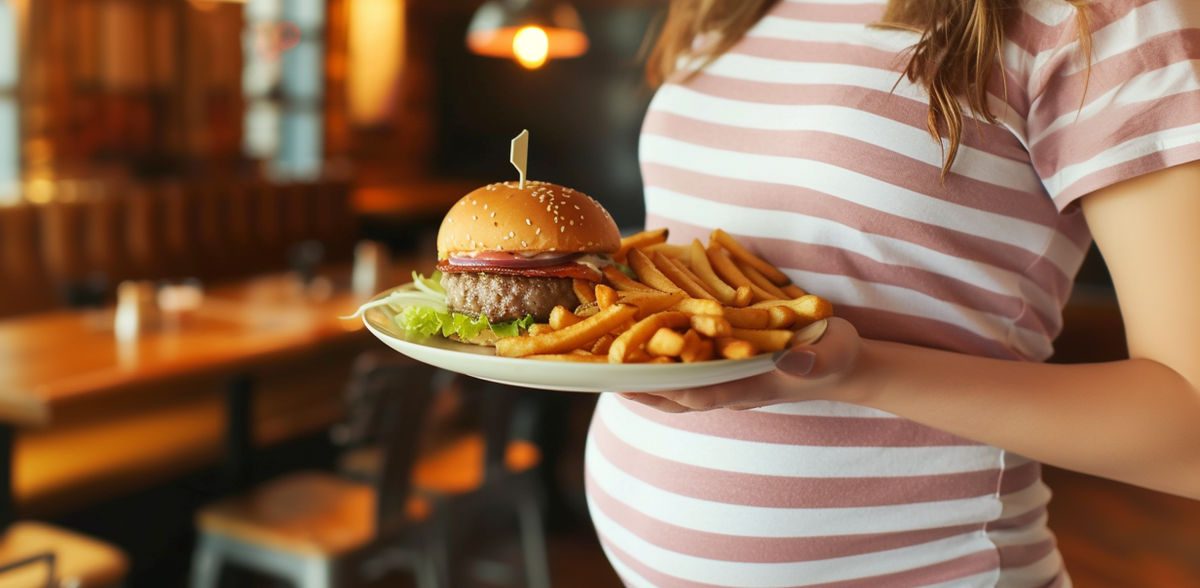Pregnant women should avoid ultraprocessed, fast foods
Curiously, it’s not the food that the study targets but what touches the food before you eat it
If you’re pregnant, you may want to think twice before making a hamburger run or reaching for a prepackaged pastry, according to research published last month in the journal Environmental International.
Oddly enough it’s not the food that the report targets — not the fries, burgers or even the shakes and cakes — but what touches the food before you eat it.
Research shows that phthalates, a class of chemicals associated with plastics, can shed from the wrapping, packaging and even from plastic gloves worn by food handlers into food. Once consumed during pregnancy, the chemicals can get into the bloodstream, through the placenta and then into the fetal bloodstream.
The chemical can cause oxidative stress and an inflammatory cascade within the fetus, researchers noted. Previous literature has indicated that exposure to phthalates during pregnancy can increase the risk of low birth weight, preterm birth and child mental health disorders such as autism and ADHD.
This is the first study in pregnant women to show that diets higher in ultraprocessed foods are linked to greater phthalate exposures, the authors wrote.
“When moms are exposed to this chemical, it can cross the placenta and go into fetal circulation,” said senior author Dr. Sheela Sathyanarayana, a UW Medicine pediatrician and researcher at the Seattle Children’s Research Institute.
This analysis involved data in the Conditions Affecting Neurocognitive Development and Learning in Early Childhood (CANDLE) research cohort, which comprised 1,031 pregnant individuals in Memphis, Tenn., who were enrolled between 2006 and 2011. Phthalate levels were measured in urine samples collected from during the second trimester of pregnancy.
The researchers found that ultraprocessed food composed 10% to 60% of participants’ diets, or 38.6%, on average. Each 10% higher dietary proportion of ultraprocessed food was associated with 13% higher concentration of di(2-ethylhexyl) phthalate, one of the most common and harmful phthalates. The phthalate amounts were derived through urine samples taken from the women in the study.
Ultraprocessed foods, according to the researchers, are made mostly from substances extracted from foods such as oils, sugar and starch, but have been so changed from processing and the addition of chemicals and preservatives to enhance their appearance or shelf life that they are hard to recognize from their original form, researchers noted. These include packaged cake mixes, for example, or packaged french fries, hamburger buns and soft drinks.
When it comes to fast food, gloves worn by the employees and the storage, preparation, serving equipment or tools may be the main sources of exposure. Both frozen and fresh ingredients would be subject to these sources, said lead author Brennan Baker, a postdoctoral researcher in Sathyanarayana’s lab.
This is the first study, researchers say, to identify ultraprocessed foods as a link between exposure to phthalates and the socio-economics issues facing the mothers. The mothers’ vulnerability might stem from experiencing financial hardships and from living in “food deserts” where healthier, fresh foods are harder to obtain and transportation to distant markets is unrealistic.
“We don’t blame the pregnant person here,” said Baker. “We need to call out manufacturers and legislators to offer replacements, and ones that may not be even more harmful.”
More legislation is needed, the authors said, to prevent phthalate contamination in foods by regulating the composition of food wrapping or even the gloves that food handlers may use.
What should pregnant women do now? Sathyanarayana said that pregnant women should try to avoid ultraprocessed food as much as they can, and seek out fruits, vegetables and lean meats. Reading labels can come into play here, she added.
“Look for the lower number of ingredients and make sure you can understand the ingredients,” she said. This applies even to “healthy foods” such as breakfast bars. See if it’s sweetened with dates or has a litany of fats and sugars in it, she said.
Original publication
Brennan H. Baker, Melissa M. Melough, Alison G. Paquette, Emily S. Barrett, Drew B. Day, Kurunthachalam Kannan, Ruby HN Nguyen, Nicole R. Bush, Kaja Z. LeWinn, Kecia N. Carroll, Shanna H. Swan, Qi Zhao, Sheela Sathyanarayana; "Ultra-processed and fast food consumption, exposure to phthalates during pregnancy, and socioeconomic disparities in phthalate exposures"; Environment International, Volume 183

























































